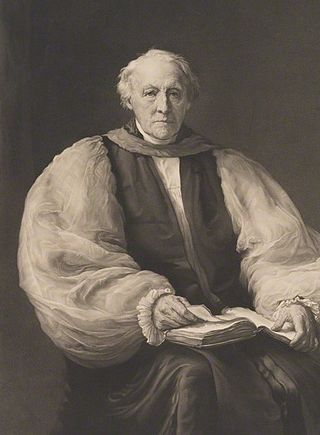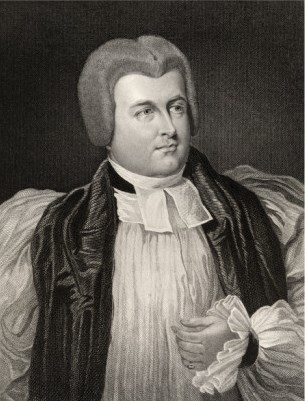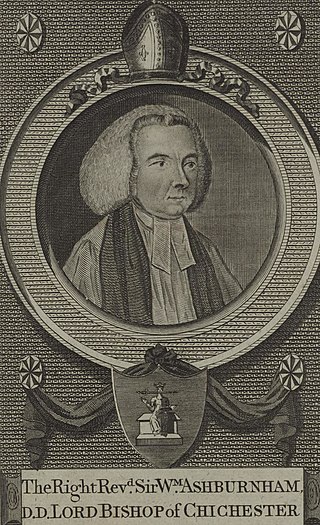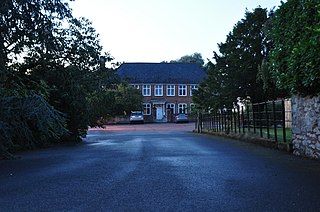Related Research Articles

Earl of Chichester is a title that has been created three times, twice in the Peerage of England and once in the Peerage of the United Kingdom. The current title was created in the Peerage of the United Kingdom in 1801 for Thomas Pelham, 2nd Baron Pelham of Stanmer.

Matthew Wren was an influential English clergyman, bishop and scholar.

Arlington was a manor, and is a village and civil parish in the North Devon district of Devon in England. The parish includes the villages of Arlington and Arlington Beccott. The population of the parish is 98.

William Reade or William Rede (c.1315–1385) was a medieval bishop, theologian and astronomer.
Philip Freeman (1818–1875) was a Church of England cleric and Archdeacon of Exeter.

William Champion Streatfeild was the Anglican Bishop of Lewes. He was a descendant of the historic Streatfeild family, the father of the novelist Noel Streatfeild, and appears as the beloved but over-saintly father of the heroine, Victoria, in her autobiographical novel A Vicarage Family.

Richard Durnford was the Bishop of Chichester from 1870 to 1895.
William Richard Wood Stephens was Dean of Winchester from 1895 to 1902.

The Dean of Chichester is the dean of Chichester Cathedral in Sussex, England.

Robert James Carr (1774–1841) was an English churchman, Bishop of Chichester in 1824 and Bishop of Worcester in 1831.

Richard Woodman was a Protestant martyr, who was born in Buxted and lived in nearby Warbleton in East Sussex. He was burnt during the Marian Persecutions in 1557 in Lewes. The cult of the Sussex Martyrs is said to have been started using an etching by James Henry Hurdis of Woodman burning as a Protestant martyr.
Combe Miller was a Church of England clergyman. He was the third son of Sir John Miller, 4th Baronet Miller of Froyle and Susan Combe.
George Chandler (1779?–1859) was an Anglican priest.
The Venerable Thomas Ball was the son of Lawrence Ball, of Eccleston, Lancashire, and a Church of England clergyman.

Sir William Ashburnham, 4th Baronet was a Church of England priest and also a baronet.
James Hargraves or Hargrave (1690–1741) was an English Anglican divine who became the Dean of Chichester Cathedral in 1739.

Lambert Barnard, also known as Lambert Bernardi (c.1485–1567), was an English Renaissance painter.
The Ven. Charles Webber, MA (1762–1848) was Archdeacon of Chichester from 1808 until his death.

Ford's Moore is an historic estate in the parish of Plymtree in Devon. From before 1161 to 1702 it was the seat of the at Ford family, whose coat of arms is recorded in the heraldic visitation of Devon as Gules, a castle argent crowned or on the port a cross formée of the third. The present farmhouse is a grade II* listed building which remains largely unaltered since it was built in the late 17th century as the mansion-house of the Ford family, when it was one of the earliest brick-built houses in Devon. The interior contains much original decorative plasterwork and carpentry, including a dogleg staircase. A much worn ledger stone survives on the floor of Plymtree Church inscribed: Roger Forde, Esquire, was here buried July the 21st An Do 1631, with another to Thomazin Ford (d.1690) inscribed: Here lyeth the Body of Thomazin Ford, wife of Charles Ford of Plymtree, Esq., and Daughter of Abraham Webber, Gent., who departed This life the xxth day of September in The yeare of Anno Do. 1690, aged 69 yeares. Ann Ford, a co-heiress of Ford's Moore, married William Chave, and purchased or otherwise obtained all the outstanding shares in the property. She bequeathed it to her cousin William Wright of Collumpton, from whom it descended to his niece the wife of Charles Phillpott, the owner in 1822, a banker from Bath in Somerset, commissioned into the Freemasons of Bath in 1784. In 1850 the owner was A. Philpott, Esquire.
Lambrocus Thomas was a Welsh clergyman who served as Canon Chancellor and Dean of Chichester Cathedral.
References
- Brandon, Peter (2006). Sussex. London: Robert Hale. ISBN 0-7090-6998-7.
- Durnford, Charles; East, Edward Hyde (1797). Reports of Cases Argued and Determined in the Court of the King's Bench from Michaelmas Term 26th George III to Easter Term, 27th George III. Volume 1 (5th ed.). London: White, Byrne, Moore and Rice. Retrieved 29 January 2012.
- Hennessy, George (1900). Chichester Diocese Clergy Lists: Clergy Succession from the earliest time to the year 1900. London: St Peters Press.
- Hobbs, Mary, ed. (1994). Chichester Cathedral an Historical Survey. Chichester: Phillimore. ISBN 0-85033-924-3.
- Marsh, John (1998). The John Marsh Journals: The Life and Times of a Gentleman Composer (1752–1828). NY: Pendragon. ISBN 0-945193-94-7.
- Horsfield, Thomas Walker (1835). The History, Antiquities and Topography of the County of Sussex. Vol. II. Lewes, Sussex: Sussex Press.
- Lysons, Daniel; Lysons, Samuel. "Parishes: Plympton St Maurice - Pyworthy". Magna Britannia: Volume 6, Devonshire. British History Online. pp. 408–425. Retrieved 27 November 2016.
- "London Gazette Issue number:13213". HMSO. 26 June 1790.
- Oliver, George (1861). Lives of the Bishops of Exeter and a History of the Cathedral. Exeter: William Roberts.
- Venn, J; Venn, J. A., eds. (1922–1958). Alumni Cantabrigienses (10 vols). Cambridge University Press.